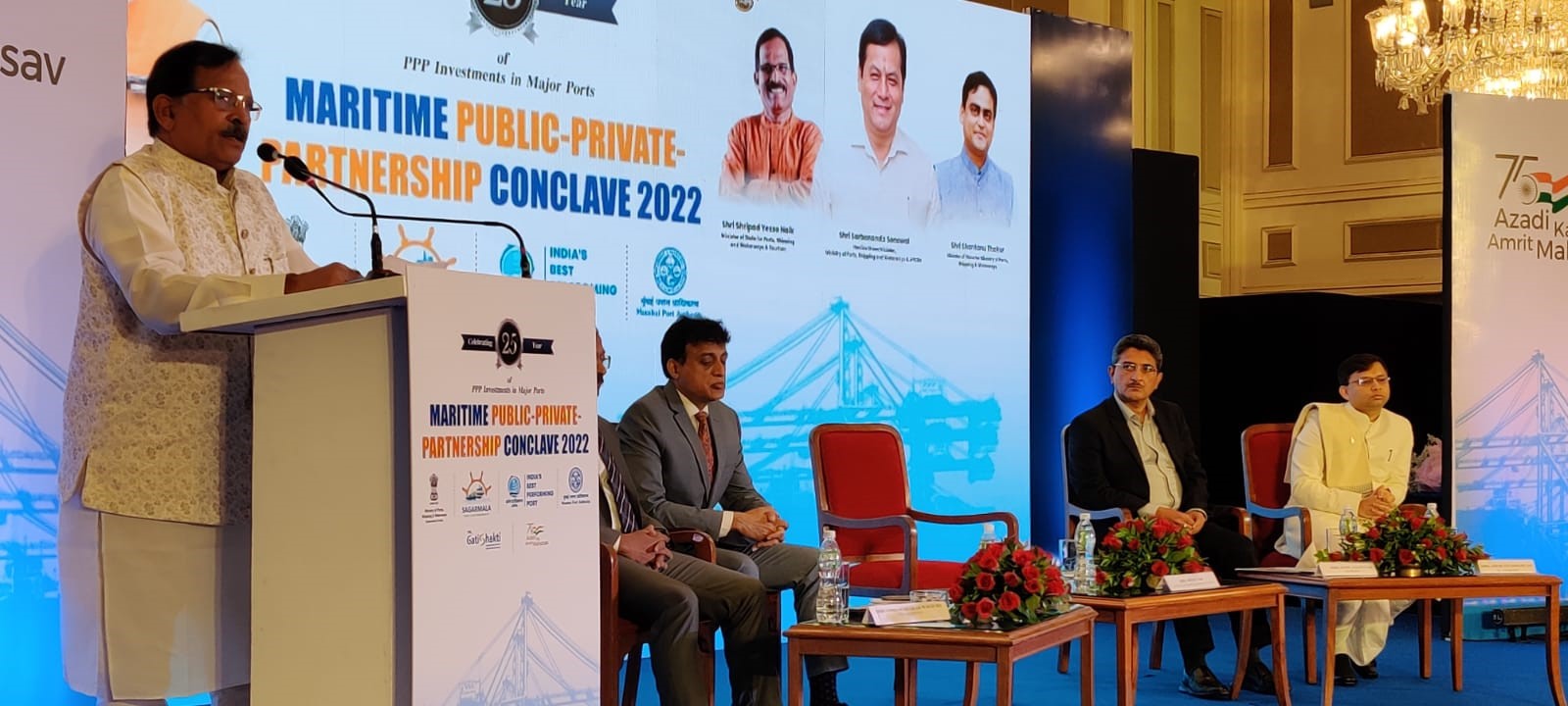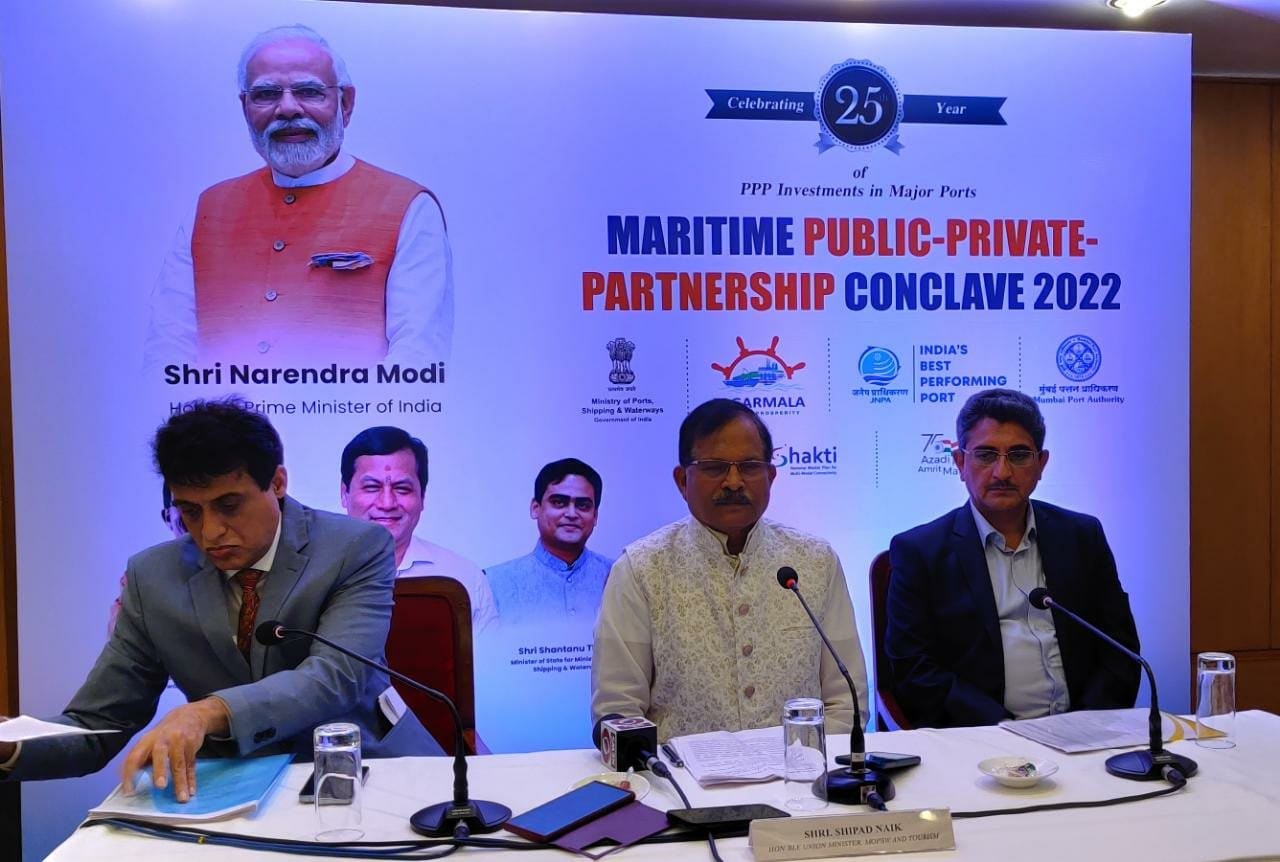
Mumbai, 5 July 2022
Union Minister of State for Ports, Shipping and Waterways and Tourism Shri Shripad Yesso Naik inaugurated a two-day ‘Maritime Public-Private Partnership Conclave, 2022’ in Mumbai today. The focus of the conclave is on Public-Private Partnership (PPP) in the development of ports sector in the country. It has been organized to mark the successful completion of 25 years of the very first agreement between the Concessioning Authority and Concessionaire on PPP Mode in the country. Jawaharlal Nehru Port Authority (JNPA) was the pioneer in PPP and entered into the first agreement with the private player Nhava Sheva International Container Terminal (NSICT) in July 1997 making it the first port terminal to be developed on PPP basis. Since then, the PPP mode has become the preferred mode of infrastructure development in Major Ports.

Speaking on the occasion, MoS Shri Naik highlighted how the PPP model has played a vital role in developing India’s port sector. The PPP model was put in place to redefine performance through capacity augmentation, efficiency and productivity enhancement, and increased competition, he said. When the port privatization programme was flagged off in India in 1997, the sector witnessed new investments including foreign investments, further stated the Minister. Presently, there are 32 PPP projects working successfully in the major ports, he informed. Shri Naik also informed that PPP accounts for nearly 90% of the new investment in Berth/Terminal infrastructure.
Stating that a supportive environment is needed to further strengthen existing and future PPPs, the Minister said, “The government is working on providing a conducive ecosystem by implementing policies to enhance the legal and political environment, improving the efficiency of the public sector, preparing a robust institutional framework, fastening the clearance processes and providing funding assistance”.
“As we embark on a new era of economic resurgence, bolstered by port-led development, we look forward to streamlining initiatives to promote private participation”, added the Minister. The Minister also urged all the maritime stakeholders to share their views on the development of this model and the challenges faced in the sector.

Modernization of port infrastructure requires expansion/upgradation of berths, construction of new berths/terminals, installation of new and modern equipment, automation of port operations and implementation of web-based port community system. Roping in private players with the major ports is not only improving the efficiency of the port sector but also increasing the earnings, said the Minister.

The investment-driven through the PPP model will offer greater training and employment opportunities for workers, create job opportunities and enhance Indian companies’ share in the global market, he further stated. Also, PPP projects in the ports sector are of great significance in making Indian ports more competitive and thereby strengthening India’s position in international trade, he said.
The Chairman of JNPA Shri Sanjay Sethi said that infusion of the PPP model in the infrastructural development has enabled us to attain a higher economic growth trajectory. The Chairman of Mumbai Port Trust Shri Rajiv Jalota said, PPP has met the major objectives of capacity augmentation and increase of traffic volume and productivity in the major ports.
The two-day conclave, organized jointly by JNPA and Mumbai Port Trust also conducted a panel discussion with stakeholders on various significant topics like ‘25 years of PPP Projects in India – Evolution, and sharing of experience’, ‘Developing world-class ports’, ‘MPA Act & Tariff Dispensation – Issues & Concerns’, ‘Future projects in Maritime Sector in Maharashtra’, ‘PPP projects – Past and way forward’, ‘Overview of NHLML Projects in Maharashtra’, ‘Future of PPP Projects in Major and Non-Major Ports in India’, and ‘Proposed Marina at Mumbai Port on PPP mode’.
* * *
PIB Mumbai | RT/SC/DR
Follow us on social media: ![]() @PIBMumbai
@PIBMumbai  /PIBMumbai
/PIBMumbai ![]() /pibmumbai
/pibmumbai  pibmumbai@gmail.com
pibmumbai@gmail.com



